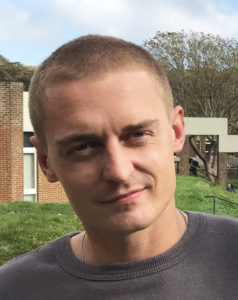Wil Hopson is currently studying our master’s course in Food and Development. In this interview, he tells us how he came to be here at the University of Sussex and IDS*, what it’s like to study here and his hopes for the future.

Why did you choose to do a master’s degree in food and development?
I was working as a chef in London and encountering first-hand all sorts of food waste issues. After one particular experience in the summer I decided that I wouldn’t be able to make a difference in my chef whites. Like all of us seeing food related issues appear more and more in the news and on our social media feeds, I wanted to understand the systems in place and try to work out ways in which we can change them! So I decided to return to education where I’d always enjoyed myself. I was lucky enough to find the perfect course. Since joining the MA Food and Development, I have realised that these systems are so complex and run so deep that the learning progress is constant and will forever be changing, something that both excites and scares me.
Why did you choose Sussex?
For a number of reasons. The first is that the MA in Food and Development really encompassed everything I was interested in, such as sustainable food systems, food politics, value chains and corporate power. Secondly, the University’s reputation (including IDS) as the number one in the world for development studies undoubtedly played role. And thirdly, I was born and raised in nearby Chichester, and knew Brighton was a lot of fun.
What modules are you taking and why?
I am taking Fair Trade, Business and Sustainable Development. Fair Trade and Business appealed to me because I am hoping to work internationally after I finish the Master’s and while I appreciate the values driving the fair trade movement I want to know more about how it works in practice. Sustainable development is a module that looks interesting from a similar perspective. Sustainability is the buzz word, but I want to know what it really means!
What did you think when you first arrived?
How am I ever going to write an essay after three years writing nothing longer than a menu! The support has been excellent and I have managed the impossible and produced a couple of essays already.
What support did your receive to help you get settled?
There was a friendly induction week where I met some of my cohort and was introduced to the various departments. Alongside that there are plenty of spaces to have conversations with various members of staff and fellow students.
How would you describe the teaching?
The teaching has been excellent across the board. In IDS we have had a world leader from the field every week talk us through some very complex but fascinating issues, some of which I wouldn’t have said I would ever have been interested in. Pastoralism in Ethiopia for example. It sounds very particular, but in reality it plays into all sorts of broader narratives. At Sussex heavy development theory is taught with a lightness of touch and deep understanding of the material.
What extra-curricular opportunities have you got involved in, if any?
So far none, although I am hoping to attempt a few more seminars and workshops in the new year!
Where are you living in and what’s it like?
I live in Brighton, right on the seafront. It’s really fantastic. There is truly no one judging you in Brighton. The live and let live attitude is really the life blood of the place.
What one thing has impressed you most about IDS and the University of Sussex?
The teaching has been excellent; the nature of both the lectures and seminars is very much student focussed and debates, and challenges, are encouraged. Aside from that the professional feel of IDS as a research institute.
What has been the most rewarding experience you’ve had so far in this course?
Engaging with debates and areas that I would never have been exposed to otherwise.
What are the three most important things you will take away from this course?
- An appreciation of the complexity of everything to do with food systems!
- Considering trade-offs, cultural difference and perspectives before wading into a debate.
- Being organised. Sounds generic, but with the amount of research and new information to take on every week it’s imperative.
How do you hope your experience at IDS and the University of Sussex will help Transform Your World?
I hope to move abroad next September to work internationally, and what better place to facilitate this academically than the Global Studies world leader.
*This MA draws on wide-ranging expertise of faculty at both IDS and School of Global Studies at the University of Sussex (where students are based).
